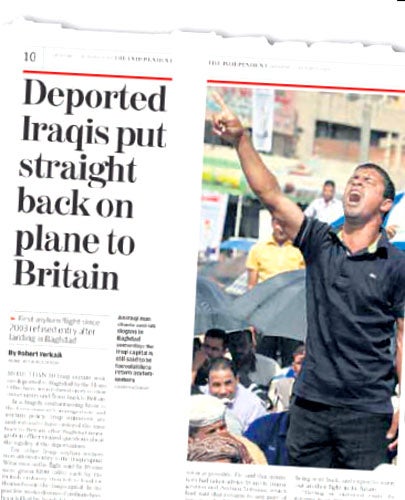Anger as asylum seekers forcibly returned to Iraq

Your support helps us to tell the story
From reproductive rights to climate change to Big Tech, The Independent is on the ground when the story is developing. Whether it's investigating the financials of Elon Musk's pro-Trump PAC or producing our latest documentary, 'The A Word', which shines a light on the American women fighting for reproductive rights, we know how important it is to parse out the facts from the messaging.
At such a critical moment in US history, we need reporters on the ground. Your donation allows us to keep sending journalists to speak to both sides of the story.
The Independent is trusted by Americans across the entire political spectrum. And unlike many other quality news outlets, we choose not to lock Americans out of our reporting and analysis with paywalls. We believe quality journalism should be available to everyone, paid for by those who can afford it.
Your support makes all the difference.Ministers faced a wave of anger last night after ordering the forcible return of failed asylum-seekers to Baghdad despite the violence that continues to plague the Iraqi capital.
A flight containing about a dozen Iraqis who had been claiming refuge in this country was due to leave Britain early today for Baghdad. The decision to go ahead with the deportations was taken in the face of United Nations guidelines and despite a Foreign Office warning against all travel to the city.
The returns to Baghdad, which is still suffering suicide bombings and sectarian violence more than seven years after the war, were condemned by human rights and refugee groups.
Several returns have already taken place to northern Iraq, which is viewed as relatively safe. But only once before has a plane-load of rejected asylum-seekers been sent to Baghdad – and it ended in farce when Iraqi officials turned away most passengers.
One of the refugees on today's flight, who has been living in Britain for six years, claims his membership of Saddam Hussein's Ba'ath Party makes him vulnerable to attack. His solicitor told The Independent last night: "The high profile of someone returning from the West could make him an easy target."
Separate deportation flights from Norway and the Netherlands to Baghdad were also due to take place today.
Last October more than 30 asylum-seekers deported to Baghdad by the Home Office were refused entry to their own country and flown back to Britain. But, despite continued wrangling over the legality of returns to the Iraqi capital, the Government is reviving the previous administration's returns policy. A second flight is also scheduled to leave Britain next week.
Dashty Jamal, general secretary of the International Federation of Iraqi Refugees, said: "I'm very unhappy this coalition government – especially as it contains Liberal Democrats – is continuing this inhumane policy. There are still lots of problems with security in Iraq. Workers are being killed daily. There are many murders, kidnaps."
Jan Shaw, Amnesty International's UK refugee programme director, said: "It is unfathomable the UK can consider Baghdad a safe place to return people. As far as we are concerned, removing someone to Iraq should only take place when the security situation in the whole country has stabilised."
Amnesty International recently documented the killings of scores of civilians in Baghdad, some of whom were tortured before their mutilated bodies were dumped in the street. It said returning asylum-seekers often suffered abuse and violence.
"Muhsin", a former interpreter for the Multinational Force, returned to the city after claiming asylum in various European countries for two years. On his arrival he was beaten, threatened with detention and forced to hand over $1,300 (£902). A month later he was arrested and beaten again. After just four months back in the city he fled Iraq for the second time.
Donna Covey, chief executive of the Refugee Council, said: "This is an astonishing and alarming move that disregards all of the evidence that Baghdad is still a very unsafe place. Returning small numbers of individuals to a city where their safety is far from guaranteed is both costly and shows a serious disregard for their welfare."
Matthew Coats, head of immigration at the UK Border Agency said: "In 2008 the courts found that we were able to return people to Iraq. The security situation in Iraq is significantly better now than it was in 2008."
Join our commenting forum
Join thought-provoking conversations, follow other Independent readers and see their replies
Comments